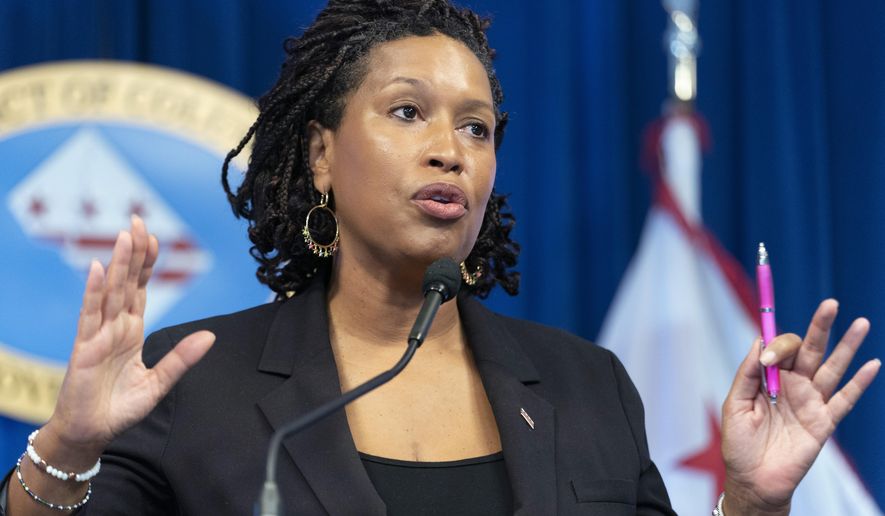The D.C. Council voted Tuesday to override Mayor Muriel Bowser’s veto of a major rewrite of the city’s criminal code.
The 12-1 vote means the legislation will now go before Congress, which has the final say on all of the District’s proposed laws. The only dissenting member was Ward 8 representative Trayon White.
Ms. Bowser had vetoed the bill, saying it was soft on crime because, among other things, it offers criminals early release from prison and removes most mandatory minimum sentences.
The council members disagreed.
“Do not believe the hype. The Council is not tying the hands of our law enforcement officials or making crime worse,” Ward 1 Councilmember Brianne K. Nadeau said ahead of her “yes” vote at the meeting.
She also blamed politicians and the media for “spreading lies and sowing fear” about the overhauled code.
Gregg Pemberton, the president of D.C. Police Union, said in a statement following the override vote that “the mayor is the only elected representative listening to District residents on crime and violence.”
“This law, once enacted, will lead to violent crime rates exploding even more than they already have,” Mr. Pemberton continued. “It’s reprehensible that the Council would smugly continue to support failed policies at the expense of the lives of our most vulnerable residents.”
Tuesday’s vote concludes a tense episode between Ms. Bowser and her council, who have been at odds since the new code that redefines criminal conduct and its corresponding penalties in D.C., was first brought before the council in November.
Ms. Bowser has repeatedly knocked the bill for being too soft on the city’s biggest public safety issues, particularly as it relates to violence among juveniles and reduced penalties for violent offenders.
“None of us can be satisfied with young people having weapons and using weapons and killing each other,” Ms. Bowser said ahead of her veto earlier this month. ”Any time there’s a policy that reduces penalties, I think it sends the wrong message that takes the focus off of using guns or possessing guns.”
Critics of the legislation also not that it will give anyone charged with a misdemeanor offense the right to a jury trial — a burden that D.C. Chief Judge Anita Josey-Herring said will have an “extensive” impact on the District’s understaffed judiciary.
Supporters of the legislation, meanwhile, argue that the changes will more clearly define crimes and offer more proportional penalties for offenders.
The heavy penalties in the current code don’t deter criminal behavior to begin with, advocates argue.
The bill won’t be enacted until October 2025, giving the council time to amend the legislation if members deem it necessary.
There were attempts to do that during the bill’s readings before the council last fall.
Ward 2 councilmember Brooke Pinto and now-former Ward 3 councilmember Mary Cheh were seeking to increase the penalties for gun possession offenders from a two-year sentence to a four-year sentence.
However, the remainder of the council didn’t support adding that to the bill.
Denise Krepp, the former Advisory Neighborhood Commissioner in D.C.’s Hill East neighborhood, also wrote a letter to federal lawmakers in December urging them to “disapprove the bill” and “stop it from becoming law.”
Congress now has 60 days to weigh in on the bill, which is formally titled the Revised Criminal Code Act, before it can become law.
In those 60 days, the House, which now is controlled by Republicans suspicious of the all-Democratic city council, can alter or completely override the law.
• Matt Delaney can be reached at mdelaney@washingtontimes.com.




Please read our comment policy before commenting.